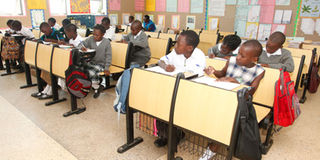No money: How can private schools survive the crunch?

For private schools to keep operational in these hard financial times, they must devise means of increasing their income.
Photo by Rachel Mabala
With the cost of living getting higher every year, sustaining a privately owned school is getting tougher. This is because most private schools rely entirely on funding from school fees to run. Very few get subsidiary income from sponsors or government.
Currently, there are about 20,000 private schools in Uganda which also attract students from within as well as neighbouring countries such as Kenya, Tanzania, Burundi, Rwanda and South Sudan. Although some private schools charge more than twice what is paid as school fees in public schools, parents prefer them because they are perceived to have higher academic standards than public schools.
At Seeta High School, Mukono, for instance, school fees ranges from Shs1 million to Shs1.5 million from Senior One to Six respectively, while Mengo Secondary School, a government-aided one students pay Shs500,000 on average.
Despite the high fees, the difficult financial times reflecting on high costs of feeding, transport, teachers’ salaries, rent, among other expenses pose tough times for private schools.
Problems
Fatuma Mukulu, a parent, was worried that the future of students of Progressive Secondary School, Kabembe, on Kayunga Road, was in limbo following land issues that have plagued the school since start of the year. It was feared the school may not even open for Second Term because the administrators failed to clear the land on the mortgage.
To the contrary, Paul Ssesanga, who was the owner of the school, says he has found a new manager and claims to have cleared the debt he owed the money lender. “I paid in excess of the debt and want a refund of some of the money,” Ssesanga says, “It is a matter before court. After the judgment, we shall know who the right owner of the land is. Whatever is happening will be sorted in court.”
Ntinda View College in Kulambiro has not opened since January. According to Mukulu, “teachers who have not been paid for more than a year are selling school equipment such as beds, tables, chairs, and computers to get money for food. The teachers also sued the school owner in court over non-payment of salaries.”
Higenyi Jala Mwenepesa, the owner of the school, says, “Although the school was closed, I am in the process of rebranding and restoring the school so that it can be operational again very soon.” Some private schools end their terms before the official closure recommended by the Education ministry to reduce cost of feeding students to the end of the term.
Ssesanga says, “Since some school owners do not have enough funding to feed the children especially as the term ends, the children, are sent home before the actual term ends and only return to pick their report cards.”
David Ssemwogerere, the director of Suubi Secondary and Vocational College in Lwengo District, agrees that the cost of living has risen and there are financial constraints in nearly all educational institutions.
Back to barter trade
“However, as school administrators and proprietors, we have to devise ways to reduce costs to make education affordable while facilitating the running of the schools in sustainable ways,” he says. “It is the reason we accept items such as eggs as a form of school fees payment. We also equip students with simple farming skills and where possible, help them rear animals such as pigs and kroiller chicken. That way, they can contribute to their educational costs.”
Although private schools are known to offer good education, some have under-qualified teachers that are also underpaid because of limited funds.
Ssesanga otherwise agrees that school fees should be regulated. “Some schools charge high fees and others low yet they are all private schools. The ones with a low fees structure struggles to operate because they have the low income parents in mind even when it is a business,” he explains.
Dr John Chrysostom Muyingo, the State Minister for Higher Education, highlights that there are many private schools operating below minimum education standards. He says some do not have licenses, lack qualified staff and are operating in sub-standard structures, which puts students at risk.
Several private schools have devised means of sustaining themselves in business including increasing school fees. However, Dr Muyingo says, “It is not right for school owners to increase school fees anyhow. It must be through a procedure where the school board of governors is summoned to discuss the need, then sending written notification to the permanent secretary at the Education ministry giving the reason for increasing school fees.”
Probable solutions
• Raising school fees alone may not help if the money does not come in on time. The school management can also embark on having students pay their school fees promptly, probably in the first week of their arrival from holidays. This will enable the school to cater for the expenses on time.
• High student numbers can be a solution therefore, private schools can make as much publicity because these numbers can translate into income for the schools.
• The school owners can seek for aid from international donors through proposals or allow other people to have shares in the school so the school is co-owned.
• Owning a private school is a business where one must invest heavily first, before they can reap from it. “Private school owners, according to Dr Muyingo, “Must have a reliable source of income even before they start the venture. This way, they will be able to hire qualified staff, and feed their students.”
• Dr Muyingo adds, “Having ample space at the school will provide space for a school garden from which food may be able to supplement the school feeding on occasional days.
• He further says, “The ministry has tasked a committee led by Prof Frederick Kayanja to study the fees structures of both private and government schools and will come up with a regulation on the minimum amount of school fees to protect the interest of the public.”
To open up a school
According to the April 2013 guidelines for establishing private schools/institutions, any member of the public or organisation can open up a school or institution provided they meet the minimum requirements as stipulated by the Education ministry.
• Dr John Chrysostom Muyingo, State Minister for Higher Education, warns that the person should be of good reputation, get recommendation letters from local council persons. The intended school owner should have evidence of land ownership or agreements of renting the property.
• There must be enough land for expansion, playgrounds, kitchen, toilets, laboratory, school garden and physical education.
• The intending proprietor writes to the Education ministry permanent secretary asking for a lincence.
• “The intended owner must have enough money on their bank account, qualified staff and management, enough structures in terms of buildings, furniture,” the guidelines read in part.
• Upon approval, an operational licence is awarded to the school to last two school years but must be renewed six months before expiry. Licence and registration of schools is free.



